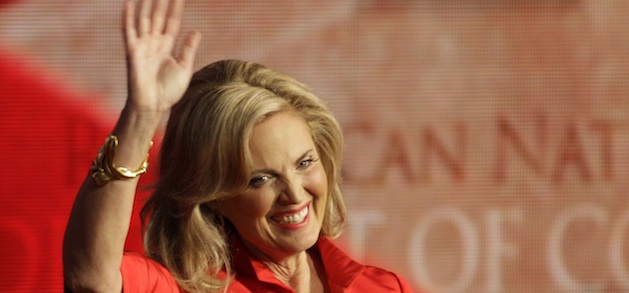What the RNC told us about the party
Anti-Obama sentiment seemed to be the only energizing emotion
Republican presidential nominee Mitt Romney watches as the balloons fall during the Republican National Convention in Tampa, Fla., on Thursday, Aug. 30, 2012. (AP Photo/J. Scott Applewhite)
Share

The balloons have fallen, the speeches are over, the pundits have pontificated, and the Republican National Convention has now given way to its DNC counterpart in Charlotte, N.C. Here’s what the Republicans showed us.
Romney’s wife Ann presented a more personal side of him – the father, the grandfather, the husband, the philanthropist. The picture she drew was warm, quite unlike what the candidate himself has been projecting. Her speech was the highlight of the convention, and had the event ended there, it might have produced a GOP bounce-back in the polls. But the convention went on for two more days, and things deteriorated.
Complaints by Bush aide Matthew Dowd that “the truth should not become a casualty in this campaign” did not keep Paul Ryan from claiming that a GM plant had been closed in his district under President Obama, when in fact the decision to shut it was taken under the Bush administration. Ryan then went on to chastise Obama for failing to endorse the bipartisan Bowles-Simpson Commission Report on the debt, which he himself opposed in Congress, and proposing $715-billion worth in Medicare cuts, something the vice-presidential hopeful had proposed as well.
Romney’s speech was not much better, when it came to the accuracy of his statements. He equated Obama’s foreign policy on Israel to throwing the close U.S. ally “under the bus.” This is not the view of Israeli Defense Minister, Ehud Barak, though, who has described the Obama administration as highly supportive. Romney continued his account of what has become the fictional Obama Apology Tour with no evidence or facts to back it up. He repeated claims made in nasty political attack-ads about welfare and Medicare changes supposedly ordered by Obama when such claims have been contradicted by non-partisan fact-checking groups. After the speech, a Romney aide dismissed questions about factual accuracy by saying that the Republican campaign would not be dictated by independent fact-checkers.
The convention had some other oddities. There was no mention, for example, of the most recent two-term Republican administration, that of former president George W. Bush, and no acknowledgment of the 9-per-cent drop in GDP that the U.S. economy suffered under GOP rule just before Obama took office — let alone the massive job losses of 2007-2008. There also seemed to be a collective amnesia about the $1-trillion deficit racked up under Bush after the Clinton administration left off with balanced budgets. And what about the war in Afghanistan, started under Bush and completely ignored in Romney’s speech? It sounded as if all was well until Obama came around. Finally, there was “Eastwooding” and the Invisible Obama.
This party may well win both the Presidency and Congress in November, so we should try to take it seriously. It is hard to do so, however, when Obama hate seems to be the one energizing sentiment. Many GOP principals doubt that climate change and abortion rights can remain the party’s litmus test. Condoleezza Rice’s “mildly” pro-choice stance is a case in point. But, judging from his speech, the current Republican presidential hopeful seems to think that kowtowing to social conservatives and neo-cons is necessary. Alas, this is far from the party of Abraham Lincoln, Theodore Roosevelt, Dwight Eisenhower and Ronald Reagan?
Now, on to the Democrats.